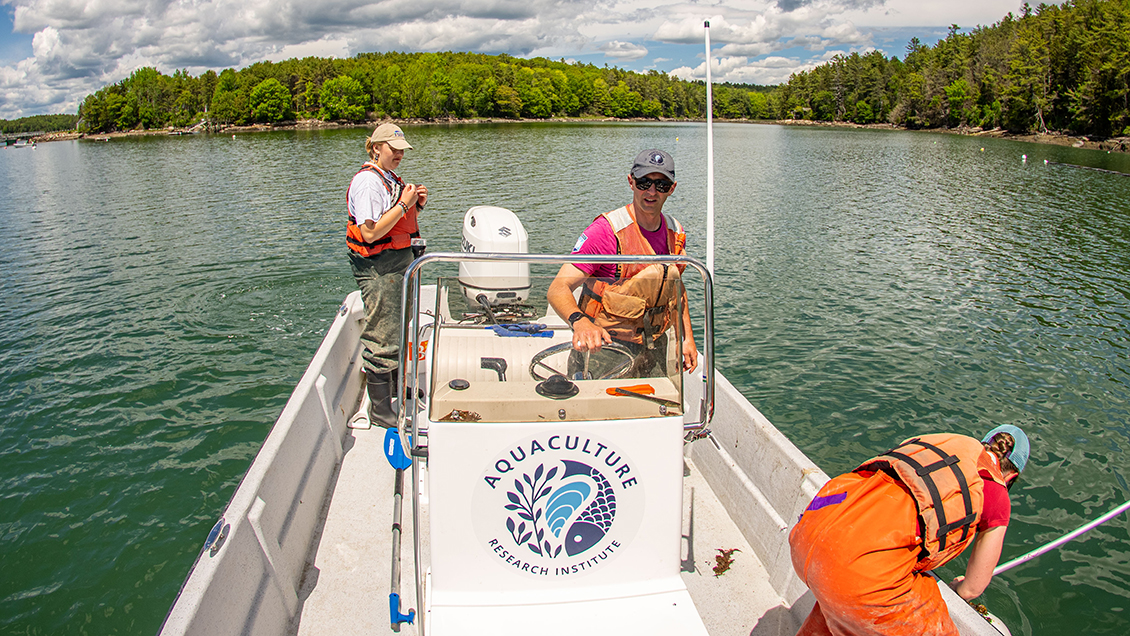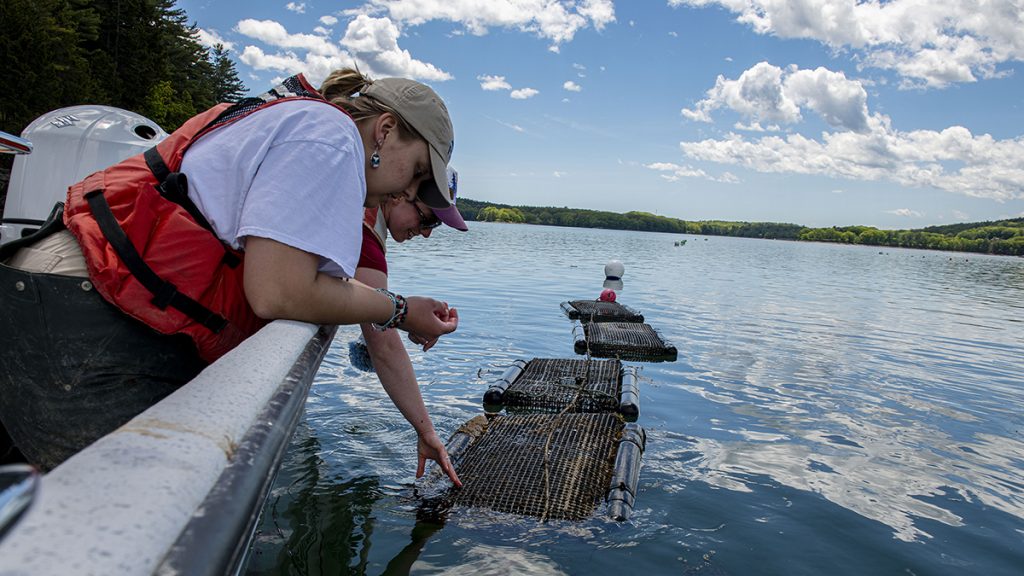
Developing Maine’s aquaculture industry
The Aquaculture Research Institute drives the development of Maine’s aquaculture industry and working waterfronts.
The Aquaculture Research Institute (ARI) at the University of Maine is charting the future of aquaculture through research and development, extension programs and workforce training. By fostering innovation and nurturing talent, ARI reinforces UMaine’s reputation as a national hub for sustainable aquaculture.
ARI, which is directed by Deborah Bouchard, associate professor of aquatic animal health, advances research and development initiatives that are broad, integrated and pivotal to industry sustainability. The research spans from enhancing sustainable feeds and boosting climate change resilience to improving hatchery technologies. An example of the technology that powers ARI’s innovation is a new state-of-the-art photobioreactor at the Darling Marine Center. The photobioreactor cultivates algae efficiently under controlled conditions, reduces reliance on wild kelp and supports high-density growth. It also nurtures gametophytes that growers can use to enhance strains for traits such as growth and nutritional value. Such technology illustrates ARI’s commitment to sustainable aquaculture amid a changing climate.
A critical dimension of ARI’s work stems from its partnership with the U.S. Department of Agriculture’s (UDSA) Agricultural Research Service (ARS). This collaboration, supported by programmatic funding, advances research in critical areas such as Atlantic salmon health, emerging pathogens, and nutritional advancements in feed. A recent significant outcome of this collaboration is the development of a method for efficiently detecting a serious viral pathogen affecting salmon. This advancement, crucial for managing the health of salmon populations, positively impacts the industry enabling a faster response to preventing disease outbreaks, improving both economic and animal welfare outcomes.
In the realm of shellfish aquaculture, ARI collaborates with USDA to develop disease-resistant strains and introduce new species in both hatchery and field settings at the Darling Marine Center. These strategies aim to boost the vitality and yield of shellfish stocks. This collaborative work enhances the sector’s resilience to climate variability, which is vital to Maine’s blue economy. Beyond advancing fundamental science, ARI research also develops practical enhancements in aquaculture techniques and production, improving operational efficiency and reducing environmental impact.

Workforce development is also a cornerstone of ARI’s mission, empowering the next generation of aquaculture professionals with practical skills and knowledge. Through internships, capstone projects, and fellowships, ARI faculty are actively involved in mentoring both undergraduate and graduate students. Through fellowship programs like our new Research and Extension Experiences for Undergraduates (REEU), ARI provides students with immersive research opportunities that let them tackle real-world problems in aquaculture while engaging with indigenous knowledge. These hands-on experiences are essential for bridging the gap between academic learning and practical application, ensuring students are prepared to excel in the fast-evolving aquaculture landscape.
Through its strategic participation in key industry advisory boards and partnership with the USDA’s ARS and Animal and Plant Health Inspection Service, ARI aligns its research efforts with the evolving needs of the industry. This collaborative model is instrumental in the sector’s employment surge, supporting more than 700 jobs. Since 2017, efforts have led to a doubling of the sector’s revenues, directly benefiting more than 1,000 households, demonstrating ARI’s role in not just advancing research, but also in bolstering economic growth and enhancing the wellbeing of numerous communities.
Looking forward, ARI is preparing for the ground breaking of the Sustainable Aquaculture Workforce and Innovation Center (SAWIC), which represents a significant step toward sustainable aquaculture advancement. This new facility will be a hub for pioneering research and specialized workforce training, aimed at equipping the aquaculture industry with innovative solutions and skilled professionals in Maine. SAWIC will address critical sustainability challenges through focused research on fish health, feed efficiency, and breeding methods. It will also serve as a catalyst for workforce excellence, offering programs that combine theoretical knowledge with practical skill-building. This will expose students to cutting-edge aquaculture practices and position them to lead in an evolving industry. SAWIC demonstrates ARI’s commitment to driving aquaculture’s growth and sustainability through innovation and workforce development, positioning ARI as a leader in the industry’s future.
AquEOUS: Aquaculture Experiential Opportunities for Undergraduate Students
AquEOUS: Aquaculture Experiential Opportunities for Undergraduate Students, led by the UMaine Wabanaki Center and Aquaculture Research Institute (ARI), is one of 23 Research and Extension Experiences for Undergraduates awarded in 2023 by the U.S. Department of Agriculture (USDA). The UMaine fellowship program is offered for five years.
Undergraduate students from across the nation are learning about sustainable aquaculture in Maine through the lens of Indigenous science and knowledge in a new University of Maine initiative funded by the USDA’s National Institute of Food and Agriculture.
Through the program, students and staff complete 10-week research projects and participate in training that enhances inclusive science communication skills, Indigenous knowledge and field techniques.
